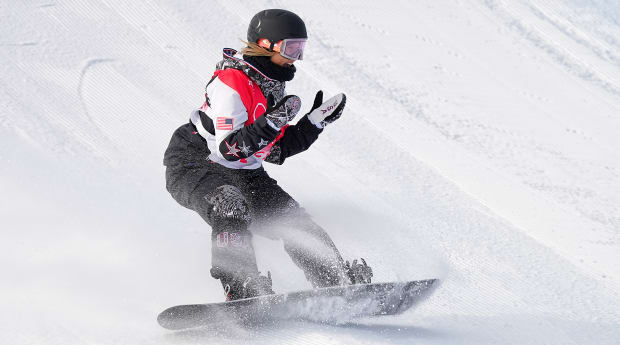
Erick W. Rasco/Sports Illustrated
ZHANGJIAKOU, China – She had crushed it and she knew it, and when the judges confirmed it, she slammed her hand down and said, “What a run! What a —ing run!” And that is how Queralt Castellet celebrated winning the non-Chloe Kim division of the snowboard halfpipe.
Kim won her second straight gold medal, and in a purely competitive sense, it came just as easily as the first. The first of Kim’s three runs in the final, her “safety run,” earned a 94 score. Nobody else would reach 91. Kim’s gold was perhaps the most predictable of the entire Olympics. But it did not feel that way to her.
“Last night, I was laying in bed thinking about today—all night,” Kim said afterward. “And that really messes with me sometimes.”
The girl who blew away the field and charmed millions in Pyeongchang is 21 now. Six of the other 11 halfpipe finalists here are younger than she is. In Korea, Kim was the charismatic fresh face entertaining everybody in sight in her ancestral home. Now that describes her friend Eileen Gu, who walked around Genting Snow Park watching Kim, then hugged her when she won.
Kim has had to navigate stardom and high expectations, and not just in her sport. These days people expect a young Asian-American star to voice opinions on a variety of topics, from anti-Asian rhetoric to mental health, and it’s a lot to bear. Kim, who took a year off from competition between Olympics, has handled it about as well as anybody could hope.
Still, for an athlete of her caliber, there is always the lingering feeling that everything is built on the foundation of dominance. The problem with making this look easy is that people think it really is. During her preparation, Kim struggled to look like Chloe Kim.
“I had the worst practice ever,” she said. “Like, I probably landed my run twice, when I’m used to landing it eight times, normally. And so that kind of puts you in a weird headspace.”
She won gold, so that feels like a side note. But consider what happened to Mikaela Shiffrin this week. Think about Simone Biles last summer. Now imagine Kim making one mistake on her safety run on a particularly challenging halfpipe. That second run would have been nerve-wracking. The third one could have been the toughest of her life.

Simon Bruty/Sports Illustrated
Instead, she basically clinched gold with the first and “overflowed with emotion.” By the time she stood at the top of the halfpipe for her third run, she knew she could ride down the middle on her stomach and still win gold. She attempted to put on a show instead.
“I was trying a cab 1260,” she said. “I just learned those pretty recently and I’ve been doing quite a bit of them, but I haven’t really done them in this halfpipe. So I was curious to see what would happen. Definitely didn't go my way, but it’s O.K.”
She failed to land it, which meant she couldn’t do the two other new tricks she had planned. When she finished and was asked how she felt, she said, “My butt hurts.”
The bubbly personality is still there; it just doesn’t bubble quite so much. That is the difference between 17 and 21. In Korea, Kim was a stream-of-consciousness wonder, tweeting about being “hangry” between runs, talking about her mom trying to get more social-media followers and teasing her father in her press conference. (“I hate talking about my dad when he’s there because he gets really cocky. He’s like, ‘You really do care about me!’”)
This time around, Kim checked her phone before her press conference started but did not use it to tweet. She did ask for snacks midway through it (and somebody brought her a few). Kim arrived in China knowing what awaited her: the pressure to perform, the perils of celebrity, the risk that it all could break her, and the value of admitting it almost did.
“I was hurting the people I love the most,” she said. “It’s O.K. to have a bad day, but you can move on. You’ll come out in a better place at the end of it all.”
She has two gold medals now, from two different Olympics—but more importantly, from two stages of life. She only nailed one of her three runs here Thursday, but in every way, that was enough.







